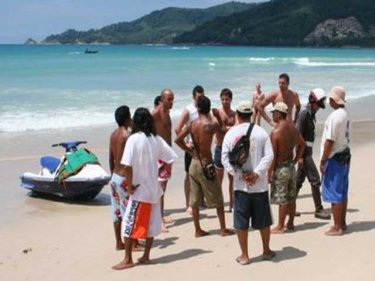Summary justice combined with compulsory jetski insurance would solve many problems associated with tourists who are often forced to surrender their passports when they are arrested.
Confiscation of passports sometimes results in wayward tourists spending weeks longer than they intended on Phuket, and, in effect, increasing the penalty out of all proportion to the crime.
The governor, new to Phuket and its problems, is also looking closely at the use of jetskis on Phuket beaches, and the whole issue of tuk-tuks on the island.
The review is timely because an economic crisis in tourism will mean that there are simply too many tuk-tuks and jetskis for the present growing number of operators to survive next year's severe downturn.
Accusations of excessive tuk-tuk prices and jetski ''scams'' are also turning tourists away from Phuket at a time when Phuket needs to clean up its image.
Most tourist complaints to the Tourism Authority of Thailand concern the high price of tuk-tuks. Prices charged by drivers on Phuket are higher than anywhere else in Thailand.
Since a previous governor decided several years ago that jetskis should be phased out, the opposite has occurred.
Phuket has never had more jetskis, and never had so many accusations of jetski-related ''scams.''
Phuketwan has been told of one case where a British tourist was asked to hand over 230,000 baht for spurious ''damage'' to a jetski.
Another tourist, this time from Australia, handed over 100,000 baht in a similar false claim.
While Thais are hospitable and honest, a small minority in Patong see tourists as a source of quick, easy money.
Compulsory insurance for jetskis and rental motorcycles would push up costs, but eliminate hardship in case of serious accident and the ''scams.''
A Tourist Court has been suggested to the governor to solve other problems in Patong, especially cases where tourists commit minor crimes, often while drunk.
Passports are confiscated out of concern that offenders may abscond before a case is settled.
The practical injustice becomes evident in cases of petty theft especially.
When a young tourist who has been caught shoplifting a 50 baht chocolate bar from a convenience store has to stay on Phuket for an extra month awaiting a court appearance, the cost to the individual could tally thousands of dollars.
The person charged may have to pay for a flight home that they cannot catch, additional accommodation for the extended period, then a new flight home.
When the accused does eventually appear in court, the fine for such a minor crime can be determined as just 1000 baht or 1500 baht. But the practical penalty imposed amounts to thousands of dollars, and perhaps also a loss of income at home.
In some cases, family members also come to Phuket to help, adding to the extraordinary cost.
Similar hardship is caused in cases of uninsured motorcycle or jetski accidents, especially where serious injury occurs.
One case on the island where a young rider was injured involved his father mortgaging the family home to cover the cost of his son's treatment after a crash on an uninsured motorcycle.
With up to 50 percent fewer tourists forecast to visit the island next year, more people now making money from the industry are expected to turn to crime to make ends meet.
Governor Preecha appears to be reacting now to long-standing problems to stave off the inevitable negative social consequences of the airports blockade.





Well I do think that is a good idea, to speed up the judicial process. But committing a crime while at home is bad enough, but to do it abroad is just stupid. For them I have no sympathy if they do what they did on purpose.
As for all the illegally run firms that offer no insurance and other scams. This should be intolerable by Phuket, as tourists are the bread and butter of Phuket, although a lot of the money is funneled into the rest of Thailand.
Upon hearing stories like this, its a wonder why anyone would want to come here and sample the life. It seems better if they just pick a resort and never leave it.
Crime happens so often and the person who loses out in most cases are the Farang. Failing that bribery by the highest bidder fixes the problems.
Tuk-Tuks need to be regulated. Set prices for distances (like a proper taxi) ALL of them should be metered.
Maybe I am becoming cynical, but I have witnessed people being ripped off, even stood up to people threatening tourists and been threatened myself for helping them.
The police always ask for money and then everything calms down . . .
Posted by Anonymous on December 11, 2008 20:52